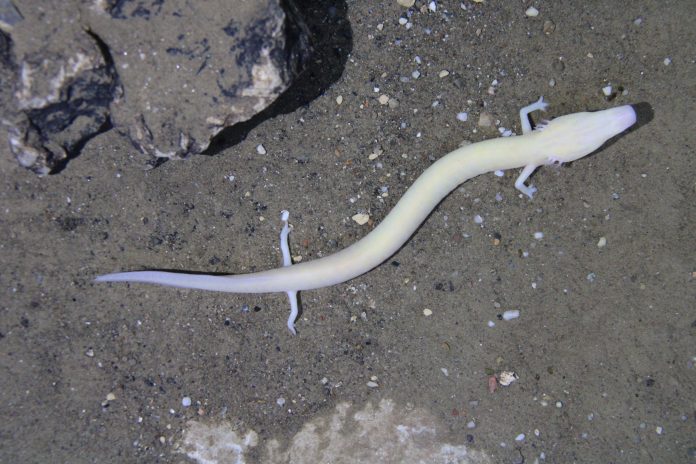by Alessandra Ressa
The picturesque town of Kranj will host an international gathering on December 7 and 8, 2024, focused on an enigmatic and endangered cave-dwelling amphibian: the proteus (Proteus anguinus), also known as the olm. This elusive, blind creature, which inhabits the freshwater ecosystems of the Dinaric Alps, is often regarded as a barometer of subterranean water quality and a symbol of biodiversity conservation in the region.
The fifth edition of the SOSProteus conference brings together scientists, conservationists, and policymakers from across Europe, including Italy, France, Croatia, and Germany. Under the title The Proteus and Its Habitat in Karstic Underground Waters: Research Methods and Data for Evaluating Its Conservation Status, the event will spotlight critical issues affecting the proteus’s habitat. These include pollution from microplastics, the impact of human activity on fragile ecosystems, and the lingering scars of historical conflicts in the region.
The proteus, native to a network of underground rivers spanning Slovenia, Italy, Croatia, and beyond, is more than a biological curiosity. Its reliance on pristine, subterranean freshwater makes it a vital indicator species. “Studying the proteus is about much more than understanding one animal—it’s about safeguarding an entire ecosystem and ensuring access to clean water for all,” said Dr. Nicola Bressi of the Civic Museum of Natural History of Trieste, who will open the conference with an exploration of ongoing mysteries surrounding this cryptic species.
A Broader Mission
The meeting’s importance extends beyond scientific discussion. A proposal by the International Union of Speleology (UIS) to designate an International Day of Caves and Karst under UNESCO auspices will be formally debated during the event. Advocates hope the recognition will draw global attention to the challenges facing karst ecosystems, which supply drinking water to millions yet remain poorly understood and under threat.
Another highlight will be a tribute to Professor Andrej Mihevc, a Slovenian geographer and a stalwart of speleological research, who passed away earlier this year. His legacy as a passionate advocate for international collaboration in cave and karst conservation looms large over the event.
Cutting-Edge Research
Scientists at the conference will present studies on genomics, environmental DNA sampling, and non-invasive monitoring techniques aimed at protecting the proteus in its natural habitat. Research will also delve into advanced technologies used to study rare and endangered species, offering hope for better understanding and preservation efforts.
One focal point of the discussion will be the Black Proteus (Proteus parkelj), a particularly rare subspecies found in Slovenia, whose shrinking habitat underscores the urgency of action.
International Collaboration
The event, held under the honorary patronage of Urška Klakočar Zupančič, President of Slovenia’s National Assembly, highlights the collaborative spirit driving proteus conservation. Organized by Gregor Aljančič and Magdalena Năpăruş-Aljančič, longstanding advocates for amphibian conservation, SOSProteus serves as a platform for exchanging knowledge and fostering partnerships.
Since 2015, the Speleovivarium Museum and the Adriatic Speleological Society of Trieste have been integral to the initiative, working alongside the Kranj Laboratory to advance public awareness and scientific understanding of the proteus and its karstic habitat.
For visitors, Kranj offers a scenic backdrop for the conference, blending historic charm with cutting-edge conservation efforts. The municipality and local tourism organizations have embraced the event, recognizing its potential to spotlight Slovenia’s unique environmental and cultural heritage.
For further details:
Email: meetingSOSproteus@gmail.com
Web: Tular.si | VisitKranj.com
As the conference unfolds, one message is clear: protecting the proteus is not just a regional imperative but a global one. In a world grappling with biodiversity loss and water crises, the lessons from the caves of Slovenia may resonate far beyond their dark, mysterious depths.





























